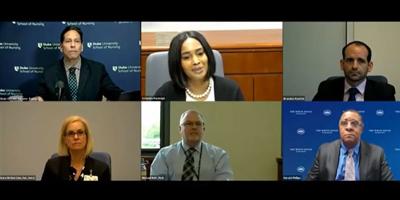Nurse leader fellow discusses HIV disparities among Black Americans at virtual White House event
Researcher highlights strategies to engage nurse scientists
 Schenita Davis Randolph presents at "The Role of Nursing in Ending the HIV Epidemic: A Call to Action" webinar Oct. 12.
Schenita Davis Randolph presents at "The Role of Nursing in Ending the HIV Epidemic: A Call to Action" webinar Oct. 12.
Schenita Davis Randolph's passion to end the HIV epidemic began as a public health nurse. Now as a researcher, the inaugural fellow in the Betty Irene Moore Fellowship for Nurse Leaders and Innovators seeks to identify meaningful interventions and ways to include nurse scientists in policy discussions about HIV prevention, intervention and research.
Randolph, an associate professor at Duke University School of Nursing and co-director of the community engagement and dissemination core of the Duke Center for Research to Advance Healthcare Equity (REACH), spoke about HIV interventions alongside a representative from the White House during an Oct. 12 webinar hosted by the Duke University School of Nursing. She was one of six presenters at “The Role of Nursing in Ending the HIV Epidemic: A Call to Action” webinar, which attracted more than 220 attendees. Her presentation, “The urgent need to address HIV disparities among Black Americans in the United States South,” outlined the high rates of HIV diagnoses in North Carolina and discussed the urgent need to address HIV disparities among Black Americans in the southern United States.
Making an impact
She presented alongside Harold Phillips, director of the White House Office of National AIDS Policy, who delivered the keynote presentation.
“Going into this presentation, I knew there was the potential to make an impact and have my voice heard on a larger platform. I wanted to be very intentional and very vocal about my message of advocating for the health of Black America,” Randolph said. “As a Black woman, I offer that culturally and socially relevant lens through shared, lived experience. Having an equity lens and understanding the contributors to health are critical to addressing HIV in the Black community.”
Randolph called for increased funding for HIV research, particularly focused on Black women in the South, and the inclusion of nurse scientists in policy-making positions that examine the impact of HIV inequities among Black women in the nation. She says women — especially women of color — must be prioritized at the national level. Additionally, decision-makers must examine how structures, systems, environments and policies impact HIV inequities among Black women in the nation.
 Webinar panel clockwise from left: Vincent Guilamo-Ramos, Schenita Davis Randolph, Brandon Knettel, Harold Phillips, Michael Vernon Relf and Kara McGee
Webinar panel clockwise from left: Vincent Guilamo-Ramos, Schenita Davis Randolph, Brandon Knettel, Harold Phillips, Michael Vernon Relf and Kara McGee
Preparing through fellowship trainings
“The Betty Irene Moore Fellowship for Nurse Leaders and Innovators leant to the success of this presentation. I was able to draw upon the trainings and workshops from the fellowship, and the strategic communications sessions during this year’s convocation, to prepare my message,” Randolph said. “I appreciate everything I’ve learned and the knowledge I’ve gained as part of the inaugural cohort.”
Heather M. Young, national director for the fellowship program, said Randolph's work exemplifies the leaders the program seeks to further support.
“Inspiring and empowering nurse scientists to make system-level changes is a large component of the fellowship. By advocating for policy changes and urging for the inclusion of nurse scientists in the conversation, Dr. Randolph is leading the way,” Young said. “I can’t wait to see her trajectory from here and how she uses her research for continued policy influence.”
Driven to make a difference, Randolph seeks a role in national policy development.
“Fewer than 2% of nurse scientists are Black and I intend to be part of the national conversation and represent nursing in this space by leading and participating on national advisory councils, committees and initiatives,” Randolph said.





